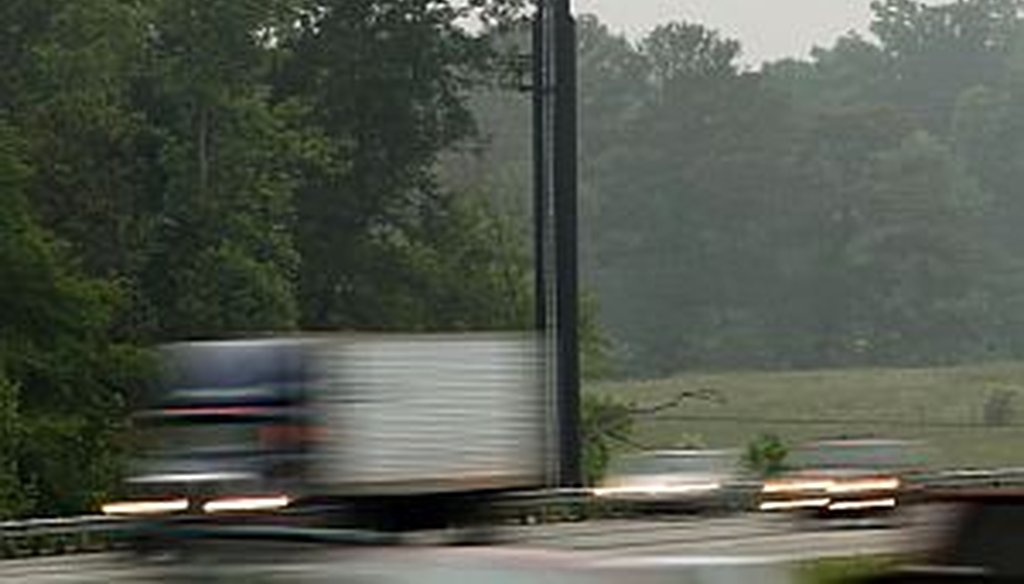Get PolitiFact in your inbox.

A sign urging voters to approve a tax to pay for transportation projects across metro Atlanta flashes over I-75 in Henry County.
As the referendum on a tax to fund transportation projects for metro Atlanta nears, our fact check tally rises.
Your PolitiFact Georgia scribes have completed nearly two dozen fact checks on Tuesday's referendum, which has made bedfellows out of earstwhile enemies.
The Sierra Club has joined forces with members of Georgia's Tea Party to oppose the measure, while Chamber of Commerce-types have allied with sustainability advocates to rally for it.
Those for and against the one-percent tax increase say that the facts and figures are on their side. Sometimes they are. Other times they aren’t.
We'll tell you who's right in this roundup of our rulings.
Want to comment on our findings? It's easy. Just go to our Facebook page and hit the "like" button. And you are free to express yourself, pro or con.
And check back soon. We'll post more as we write new stories.
Here’s how both sides have fared so far:
State Sen. Vincent Fort: Taxes on groceries and medicine will rise under a plan to improve roads and rail for metro Atlanta.
Fort used this claim to explain why the proposed transportation tax is unfair. The Democrat represents a district that stretches from East Point through parts of Atlanta.
"We shouldn't be putting a sales tax on people's food and medicine," Fort said in a television news story that aired on CBS Atlanta (WGCL-TV) on July 21.
We consulted the 2010 legislation that made the referendum possible, talked to tax experts and called the state Department of Revenue.
We found the transportation plan would impose a regional tax on groceries such as a loaf of bread or bananas. Groceries are exempt from the state’s sales tax, but local governments are allowed to tax them.
It also would tax over-the-counter medications such as the aspirin you took for the headache you got from listening to the transportation debate rhetoric.
But prescription drugs would remain tax-free.
Fort earns a Mostly True.
Atlanta Mayor Kasim Reed: The state of Georgia has lost 200,000 total jobs and 50,000 construction jobs since May 2007.
Reed, one of the most vocal advocates in support of a regional transportation sales tax, argues that the plan would jolt the region’s economy by creating jobs for people working on those transportation projects.
He said this in a July 17 news conference
PolitiFact Georgia went to the most commonly used and dependable source of labor data, the U.S. Bureau of Labor Statistics.
In May 2012, the most recent monthly BLS data available, an estimated 3,930,000 Georgians were employed. In May 2007, the number of Georgians employed 4,139,000, the federal data shows. The difference: 209,000.
In May 2007, the BLS said about 222,700 Georgians were employed in the construction industry. In May 2012, the number dropped to an estimated 141,300 Georgians. The difference: 81,400.
Reed actually underestimated the construction jobs lost.
Overall, we rate his statement as True.
Fayette County Commissioner Steve Brown: A proposed tax to fund transportation projects would spend $90,000 to take a single vehicle off the road during the morning and afternoon commute.
Brown thinks the transportation tax would be a waste of money, and said this during a July 12 forum hosted by The Atlanta Journal-Constitution.
Experts often take into account impacts on the economy, the environment, traffic flow, safety and even noise when they tally the costs and benefits of a transportation project.
We found Brown’s more simple approach may vastly overstate and understate the problem at the same time.
It does not take into account the fact that the transit infrastructure will last for generations. Plus, over the long term, it might not reduce congestion at all.
Brown also based his calculation on a transit cost estimate that’s open to accusations of cherry-picking.
Furthermore, even Brown and Ross think their own number falls short.
Brown’s claim is wrong on various levels. It earns a False.
Atlanta Tea Party Patriots co-founder Debbie Dooley: "Statistics show that more people at this time telecommute than they ride carpools, mass transit, bicycle or walk."
A tea party leader who opposes a tax to overhaul metro Atlanta’s transportation infrastructure has some ideas of her own to ease traffic congestion. This one involves no taxpayer funds being spent, and it’s already growing popular, she said.
There’s little research on telecommuting. And much of it is several years old or questionable.
According to recent U.S. Census data, in the Atlanta area nearly 78 percent of commuters drive alone. Carpool was second at 10.9 percent, and telecommuting was at 5.1 percent.
Nationwide, the percentage who use public transit (5 percent) was slightly higher than those who worked at home (4.3 percent).
In this case, Dooley’s overall thrust of her statement is correct. But including carpools into the mix takes it down a notch or two on the Truth-O-Meter.
Our ruling: Half True.
Georgia Green Party: The transportation tax is regressive, and Emory University is "literally getting its own transit line at virtually no cost to itself."
The left-wing Green Party used these arguments in a flier opposing a 1 percent sales tax to fund dozens of road, rail and other transportation projects. The referendum is July 31.
One proposed project is a $700 million MARTA rail spur from Lindbergh Center station to Emory University.
The sales tax’s regressiveness is a matter of perspective. A 1 percent sales tax on groceries has a greater impact on a person making $18,000 a year than someone making $180,000, but inequities tend to flatten out over time.
Emory paid into the line through the Clifton Corridor Transportation Management Association, which funded the design.
The university would likely claim a large share of the line’s ridership, but not all of it. The spur would serve other big employers such as the Centers for Disease Control and Prevention.
Half True.
Citizens for Transportation Mobility spokesman Jeff Dickerson: According to a national survey, transit "ridership" among people age 16 to 34 increased 40 percent between 2001 and 2009.
Dickerson made this claim July 10 during an online debate on an upcoming vote to raise taxes to pay for an overhaul of metro Atlanta’s transportation system. He spoke on behalf of Citizens for Transportation Mobility, which advocates for the penny-per-dollar sales tax.
The figure comes from the most recent National Household Travel Survey from the U.S. Department of Transportation.
The average number of miles traveled on transit by a person in this age group increased by 40 percent between 2001 and 2009.
Yet the number of trips they took on transit increased by only about 4 percent
By either NHTS measure, it’s fair to say that younger people are relying more heavily on transit. But Dickerson’s use of the word "ridership" might have led viewers to think that younger people are taking 40 percent more trips on transit.
Half True.
Senior adviser to Citizens for Transportation Mobility John Watson: The transportation sales tax would cost the average consumer an estimated $112 a year.
Watson made this claim to say the annual cost of a penny-per-dollar sales tax to upgrade the region’s transportation system would be less than the price that the average Atlanta-area resident pays over a year to be stuck in traffic.
That amount is $924, a calculation PolitiFact Georgia previously rated Mostly True.
Watson’s estimate comes from the Atlanta Regional Commission, which issued a report on the sales tax impact.
ARC based this number in part on a population estimate for the region. This estimate included children under under age 18.
But kids don’t spend as much as their parents, so PolitiFact Georgia calculated how much each resident would pay a year in additional sales tax, excluding people under age 18. Our estimate: $132.37 a year
The total comes close to ARC’s estimate. We rate Watson’s statement Mostly True.
Citizens for Transportation Mobility: Atlanta Tea Party co-founder Debbie Dooley "wants gas taxes raised."
This group, which is leading the charge in support of a regionwide penny-per-dollar sales tax for transportation projects, made this accusation against Dooley, one of their most vocal opponents.
Dooley did float the idea of raising the gas tax. But she said in the same sentence that gas prices must come down first. She also stated her distrust of elected officials with tax dollars. Neither was included in the press release.
The Citizens for Transportation Mobility statement was based on a comment by Dooley, but it leaves out some important context.
Under our rating system, that is a classic Half True.
Fayette County Commissioner Steve Brown: Portland, Ore., has "never gotten over 12 to 15 percent ridership" of its public transit system "in the past 12 years."
Transportation tax opponent Brown, a Republican, said this during a recent forum to make the point that Atlanta should not follow the example Portland, Ore., set for public transit.
If Brown said that the percentage of Portland adults who use public transit to get to work has stayed between 12 percent and 15 percent, his claim would have been accurate.
But that’s not what he said. Instead, he gave the impression that only a tiny percentage of adults in TriMet’s service area use the system.
But a credible source of data shows that about 40 percent use it a couple of times a month or more. Include infrequent riders and that number climbs to 80 percent.
Furthermore, "ridership," as transit experts understand it, is up.
Brown’s statement is misleading and needs a lot of context. He earns a Half True.
Gov. Nathan Deal: The Americans for Tax Reform pledge "relates to new taxes that were going to be initiated by legislative action."
PolitiFact Georgia switched on its Flip-O-Meter recently to discover Gov. Nathan Deal flip-flopped on a pledge to fight tax increases with his support of a proposed $7.2 billion transportation tax.
Deal countered with this defense.
The pledge was created by the anti-tax group Americans for Tax Reform, and it said Deal "will oppose and veto any and all efforts to increase taxes."
The pledge makes no mention of taxes that are initiated by legislative action. Or anything else, for that matter. There are no cuts in the transportation tax proposal that would make it revenue-neutral.
ATR’s state government affairs manager, Joshua Culling, told us that Deal is wrong about his interpretation of what he signed.
ATR knows the meaning of the pledge better than anyone. Our rating: False.
Former state lawmaker Terry Lawler: "There is no Plan B" if the transportation referendum is not passed by voters
Next month’s monumental voter referendum to increase the sales tax rate to pay for dozens of transportation projects across metro Atlanta has voters asking whether they can have a do-over if the proposal fails.
Lawler gave this answer at a meeting organized by the Fulton County Taxpayers Foundation. He is executive director of the Regional Business Coalition of Metropolitan Atlanta
His main point: If there is another referendum, the project list wouldn’t change much.
There is a possibility lawmakers could decide not to try another referendum, which could mean there may not be a Plan B.
But the 2010 state House of Representatives bill that authorized the referendum does offer the option of another vote if this one fails July 31. The projects list could change, but it’s unknown by how much.
We give Lawler a Mostly False.
Flip-O-Meter, Gov. Nathan Deal: "I will oppose and veto any and all efforts to increase taxes."
Deal and other top Republicans have faced criticism for endorsing a proposed 1 percent sales tax to fund 157 transportation projects across the Atlanta region. The vote is slated for July 31.
Deal signed the Taxpayer Protection Pledge, which was created by Washington, D.C.-based Americans for Tax Reform. Deal signed it May 10, 2010, during his campaign for governor. It states that he "will oppose and veto any and all efforts to increase taxes."
Deal’s name was atop a flier for a May 23 fundraiser in support of T-SPLOST held at the home of former Cousins Properties CEO Tom Bell in Buckhead, and he has spoken in support of the referendum to several large audiences in recent months.
The T-SPLOST is an increase in the sales tax. There are no cuts to make it revenue-neutral.
Deal gets a Full Flop.
Georgia Sierra Club Director Colleen Kiernan: "For every one mile of light-rail track that will be built, 16 miles of new road capacity will be built."
Kiernan used this factoid to explain why her group opposes the upcoming transportation referendum.
To prove her point, the Sierra Club sent PolitiFact Georgia a spreadsheet with about 70 projects that would increase the number of lanes of some roads or make them longer.
The road projects would increase capacity by 367 miles, according to the Atlanta Regional Commission, the region’s planning body.
But the plan also includes other transit options, such as bus projects. In all, ARC said there is an additional 371 miles of bus service on the list.
Kiernan’s claim is essentially correct. But it needs a bit of context to move higher on the Truth-O-Meter.
Under our rating system, Kiernan gets a Mostly True.
Citizens for Transportation Mobility: A government analysis shows under a proposed transportation tax, "metro Atlanta will create or support an additional 200,000 new jobs, including jobs that are maintained year over year."
This group backs a 1 percent sales tax to overhaul metro Atlanta’s roadways and transit, which is up for a vote July 31. It used this statistic in a Georgia Trend magazine advertising supplement to make its point.
The data comes from a report by the region’s planning agency.
We found that this claim misleads the typical reader into thinking that the planning agency predicted the overhaul would create 200,000 jobs in the next few years.
But those are "job years," a measure equaling one job lasting one year. It will take decades to reach the 200,000 mark.
It would be more accurate to say that the overhaul would create or sustain an average of 7,120 jobs each year for 40 years.
Mostly False.
Metro Atlanta Voter Education Network: "[O]ver 200,000 ordinary citizens were given the opportunity to identify projects they preferred."
Pro-transportation-tax group MAVEN made this claim in a mailer sent out in early April.
Their biggest piece of evidence was that the Atlanta Regional Commission, the region’s planning agency, attempted to contact 1.3 million residents last year for telephone town hall meetings about the plan.
Some 134,400 households participated, staying on the line for an average of 10.59 minutes
ARC launched other outreach efforts such as focus groups, public meetings and an online survey. In September, 12 public meetings were attended by about 1,700 people, according to ARC meeting notes. An online survey generated 9,600 responses.
The public’s influence had limits. The decision rested with the regional roundtable. Members could accept -- or ignore -- public comments as they saw fit.
That said, MAVEN’s mailer did not say that voters controlled the process. Its statement earns a True.
Anonymous flier: A proposed regional transportation tax will last "a minimum" of 10 years, and has been approved to last longer.
The anonymous handout appeared at an April 4 Fayette County Commission workshop.
It cited Georgia Statute 48-8-245 (b)2 as the source of information on the tax’s expiration, or lack of one.
The law does not say what the flier claimed. To the contrary, it lets the proposed tax expire before 10 years are up.
Tax ends on the earliest of two dates: after 10 years, or if the state revenue commissioner determines the tax has reached its funding goal. For metro Atlanta, that goal is $7.2 billion, or $8.5 billion over 10 years in today's dollars, according to a June 2011 story in The Atlanta Journal-Constitution.
Voters must approve any extensions.
T-SPLOST may indeed survive its 10-year life span, but a zombie tax would be a creature of voters’ own making.
The anonymous flier earns a False.
Citizens for Transportation Mobility: The average Atlanta resident "spends an extra $924 each year in additional gasoline and wasted time."
This pro-transportation tax group based this claim on a report by the Texas Transportation Institute that it used as basis for the claim. Since 1982, the institute has released an annual Urban Mobility Report that examines traffic in hundreds of American cities and metropolitan areas.
The institute used a detailed formula that examined travel time during peak (rush) hours in Atlanta, how much gas was wasted and the amount of time lost while not at work or being late to the kids’ track meet.
Our research found that the assumptions it used were reasonable.
We talked to researchers who are critical of the estimate. There’s no criticism about the $924 figure, but there are critiques about how the Texas Transportation Institute reached its conclusion.
The TTI research is thorough. But it is based, in part, on estimates.
We rate this claim Mostly True.
Citizens for Transportation Mobility: "When housing and transportation costs are combined, Atlanta’s cost of living -- typically perceived as relatively low -- ranks as 7th worst out of 51 metros nationally."
We fished around for data on Atlanta’s cost of living and found a new but widely used measure called the "H+T Affordability Index." The methodology was peer-reviewed and published by an academic journal in 2008.
Our analysis of this data found that metro Atlanta ranks as the 16th-most-expensive area in the country.
The typical metro Atlanta household spends more than 52 percent of its income on housing and transportation combined. This is higher than the national average, which is slightly more than 51 percent.
Sixteen out of 51 isn’t great. The ranking reinforces Citizens for Transportation Mobility’s overall point that transportation costs significantly add to the cost of living in metro Atlanta.
But it’s not as bad as said.
It earns a Half True.
Transportation Leadership Coalition: The Georgia Regional Transportation Authority "concluded that light rail in Cobb County would more than double commute time and would therefore be unsuccessful in alleviating traffic congestion."
This anti-transportation tax group made this claim on its www.traffictruth.net website.
The referendum won’t fund light rail for Cobb County. it will pay for other rail projects, and transportation tax foes say rail is one reason why.
Volunteers for the Transportation Leadership Coalition told us they got their information during meetings for the Northwest Connectivity Study, a years-long effort in the early 2000s to find out what kind of mass transit system would help locals best cope with their commutes.
The study did not compare mass transit trip times to car commutes or look into how these mass transit projects would affect traffic congestion.
We checked our newspaper archives and other resources for any suggestion that light rail would double Northwest Corridor commute times. We found nothing.
The Transportation Leadership Coalition earns a False.
Libertarian Party Executive Director Brett Bittner: Taxpayers subsidize 80 percent of each MARTA trip
Bittner said this in a May 2 Marietta Daily Journal story about opposition to the July 31 regional transportation referendum.
MARTA pays $413.8 million in operating costs.
The agency projects fare revenue this year of $130.3 million – 31 percent of its operating costs. Local and federal government chip in $239 million in taxpayer dollars.
The service rounds out its revenue pie with some other sources of income. Advertising on buses, parking fees and land leases bring the non-taxpayer funds to $152.1 million.
MARTA tapped its reserve fund to plug a $22.7 million hole in its operating budget.
With figures in hand, the rest is just math: Taxpayers subsidize 57.8 percent of MARTA’s operating costs.
Bittner was significantly off in assigning 80 percent of the costs of a MARTA trip to the taxpayer. We rate his claim as Mostly False.
Georgia Sierra Club director Colleen Kiernan: "Right now, we have the lowest gas tax of anywhere in the country."
The Georgia Sierra Club opposes the penny-per-dollar sales tax. Kiernan said this May 14 in a WABE-FM radio interview.
The motor use fuel tax in most states is an excise tax, but several states impose both an
excise and a sales tax that is applied to the sale price of gasoline.
A 2008 UGA report says Georgia has one of the lowest excise taxes around, but Georgia is higher than most of its Southern neighbors if you include the sales taxes.
A February 2010 Tax Foundation report that showed Georgia’s gas tax per gallon was 12.4 cents, which was the second lowest in the Lower 48 states.
PolitiFact Georgia also looked at a January Tax Foundation state-by-state breakdown. Georgia’s excise tax was the second lowest. An April analysis by the American Petroleum Institute showed similar results.
Kiernan gets a Mostly True.
Our Sources
See original stories.























































